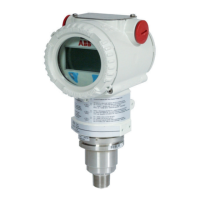18 266HSH MODBUS TRANSMITTER | PRESSURE/TEMPERATURE MULTIVARIABLE | OI/266HSHMT-EN REV. A
Always disconnect the device from the power supply
before making changes to DIP switches.
The device must then be restarted for the new configura-
tions to be loaded.
We recommend resetting the corresponding DIP switch to
position 0 after each replace operation.
Replace mode (DIP switches 1 and 2)
In normal mode the DIP switches 1 and 2 are in position 0.
If a replacement procedure is necessary, they will be
activated.
— When replacing the electronics or the sensor,
disconnect
the power supply and move DIP switch 1 to position 1.
— When replacing the secondary electronics, disconnect
the power supply and move DIP switch 2 to position 0.
— The sensor can be replaced when DIP switch 2 is in
position 1
Protocol mode (DIP switches 3 and 4)
By default, DIP switch 3 is in position 0.
— The communications protocol is then selected via the
integrated LCD indicator, the DTM or Modbus
communication.
— In position 1, the communications protocol is selected
using DIP switch 4 only.
DIP switch 4 is in position 0 by default and is active only if
DIP switch 4 is in position 1.
— In position 0, the communications protocol is set to
“Operate/Modbus”. This setting is intended for standard
operation as a Modbus device.
— In position 1, “Configure/HART-RS485,” a DTM is
needed for the parameterization of the device.
Communication with a Modbus master is not possible in
this setting.
i
i
SW 1.1
SW 1.2
REPLACE MODE (transfer system
data)
On (1): Enable: Replacement mode active
On (2): Disable: Replacement mode
deactivated
PROTOCOL MODE
On (1) Enable: Selection of
communication protocol via SW 1.4
Off (0) Disable: Selection of
communication protocol via LCD
display, DTM or Modbus
PROTOCOL MODE
On (1) Configure/HART-RS485:
Parameterization via DTM Operate/
Modbus:
Off (0) Transfer of process data via
Modbus communication to the
master.
REPLACE MODE (data transfer
direction)
On (1): New sensor: When replacing sensor
Off (0): New electronic: When replacing
secondary electronics
SW 1.3
SW 1.4
DIP switch Function
The secondary electronics is located behind the front
housing cover. The LCD indicator may have to be removed
to provide access to the DIP switches.
The DIP switches are used to make settings if an LCD
display is not present.
The interface for the LCD indicator is also used as the
service port for device configuration.
Fig. 18:

